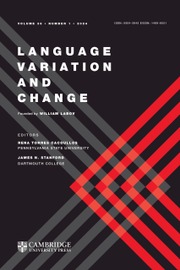Article contents
Voice quality and coda /r/ in Glasgow English in the early 20th century
Published online by Cambridge University Press: 27 July 2020
Abstract
We present acoustic and auditory analyses of changes to coda /r/ and voice quality in Glasgow English in the early twentieth century. Our initial acoustic analysis suggests that /r/ was weakening across the board based on an increase in F3. However, an auditory analysis of the same data finds no significant changes. An acoustic analysis of the same speakers’ vowels reveals that the shift in F3 is not unique to /r/. It reflects a change in voice quality, which we link to velarization using Vocal Profile Analysis. We then reanalyze the acoustic /r/ data, controlling for voice quality, and find only moderate changes that are restricted to females. These findings provide new evidence for diachronic changes in voice quality, contribute to our understanding of the development of /r/ in Glasgow English, and highlight the importance of investigating speech sounds in their broader context using multiple methodologies.
- Type
- Research Article
- Information
- Copyright
- Copyright © The Author(s), 2020. Published by Cambridge University Press
Footnotes
Jane Stuart-Smith is grateful to the Leverhulme Trust for Research Project Grant RPG-142, which supported the collection of the Sounds of the City corpus and the initial data processing. The segmentation and the first pass hand correction of the formant tracks was carried out by: Brian Jose, Robert Lennon, Rachel Macdonald, the late Farhana Alam Shaukat, and Duncan Robertson, whose work was an invaluable first step for the subsequent analysis and processing presented here. We would also like to thank three anonymous reviewers, the editors of LVC, and audiences at UKLVC 11 and NWAV 47 for their valuable input.
References
REFERENCES
- 12
- Cited by



